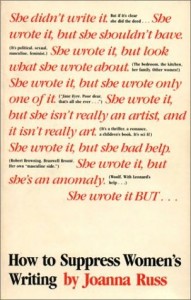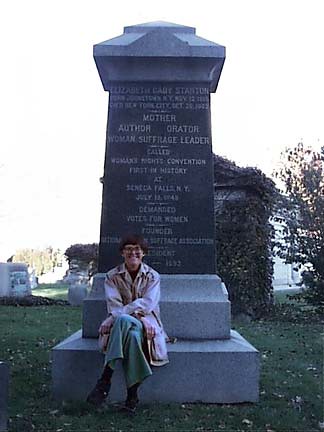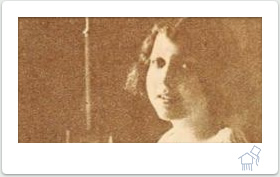Honoring Joanna Russ
Joanna Russ died today. I’m very sad. I didn’t know her personally but she was one of my feminist heroes, and I wrote back and forth with her a few times about her work. Now I wish I’d said more, written and sent the letter I was writing to her in my head these last few weeks… I had the envelope already addressed with a tiny book inside, waiting for the letter. Instead, I’m writing about her death.
I don’t know what to say. She was so important to me as a writer. I grew up reading tons of science fiction, history, literature, and poetry. When I was a teenager, I had a huge feminist awakening that most of what I read was by men, and that that wasn’t because men were just better writers. I began to go to the effort to look for women’s writing and their histories, in anthologies, in indexes of reference books, in bookstores, and when I got to college, picking classes based on the reading list gender breakdown. It was in my first year of college at University of Texas at a co-op overflow book sale where I saw a stack of Russ’s book How to Suppress Women’s Writing. I read most of it on the floor of the bookstore and then bought several copies for a dollar each and gave them away to people. I bought it for years whenever I saw it in bookstores (to give to people) and seems like I always had a few copies floating around my bookshelves. I read all her other work that I could find and was blown away by The Female Man and We Who Are About To…. Once I got to WisCon, and then even better once there were online bookstores, I read all of her work. I highly recommend What Are We Fighting For? as a thoughtful exploration of feminism and feminist practice.
But it’s How to Suppress Women’s Writing that means the most to me. Back when I was 17, a writer and already deep into researching and cataloguing women writers who I felt were neglected by history and literary criticism, it was absolutely life changing to come across this book that outlined *patterns*. Russ gave the methods of suppressing women names. She made them easy to recognize and name. That’s so important! From that point on I had a useful intellectual framework, a helpful bullshit-detector, that helped me identify bullshit as applied to cultural production in general. It helped my own identity, because I could detect the suppression techniques applied to myself and my work, and could better resist them. And it helped me to know how important it is to focus on, and support, other women, and to be in solidarity with them and with others in groups being suppressed by what I think of as intellectual violence, by underhanded, dishonest means. I felt like the need for choice and action, for active search, for being analytical and careful about my information feeds, what I chose to research as a scholar — so much of that stemmed from Russ’s little book. I’m so grateful for all her work, especially her funny, perturbing, weird science fiction — but I love How to Suppress Women’s Writing dearly for how it helped me when I was a young and angry woman. I built on that book and on Dale Spender’s work in writing my anthology of Spanish-American women poets from the turn of the century. And its central points motivated me to collaborate with Laura Quilter, archivist of the Feminist SF Wiki, kick-ass wikipedia editor, and really, another one of the feminist scholars who I deeply admire, with our friendship one of the mainstays of my life.
When Joanna conferenced in to WisCon, for an interview with Samuel Delany, I transcribed the interview along with Laura . We sat there feeling so emotional and I think grateful, and for me at least, I felt sad that Russ had sort of retired from the fray, but glad that she could, and happy that she sounded so happy. I am wildly enthusiastic and passionate about many things but am often in pain and exhausted and fighting to get through the day, so I feel like I understand more and more that that is just one thing that happens and probably is in my own future. I am sorry if that sounds weird or isn’t well expressed. What I mean is that I think that the expectations of all of us who love and admire her might have been a bit of a burden — when is your next book! answer your fan mail! why aren’t you writing something else! — And I am glad she put down that burden at some point and was able to enjoy the sky and reading and watching Buffy, her friends and family, and kind of kicking back. It felt like a good thing to incorporate into one’s feminism. That we can respect each others’ lives or spaces and things are not all about productivity, work, writing, fighting — what are we fighting for? The right for us all not to have to fight, really. So while I’m sorry she was ill and had chronic fatigue and other problems I’m glad she had the space just to live. I hope that makes sense.
I wrote to Joanna to ask her to copyleft How to Suppress, and let me keep it in print and put it online for free, so that it wouldn’t be disappeared out of history and young people’s serendipitous discoveries — and would be online and easily bookmarkable for feminist bloggers to use as a touchtone. She seemed to like the idea and put me in touch with her agent, but nothing ever came of it. If not me, I hope someone else will be able to keep it in print in a low cost edition, maybe Aqueduct Press or someone else who will give it the care it deserves. But I loved it that she was kind enough to write me letters and postcards and stay in touch.
It helps to read other people’s thoughts on her and how her work was important to them — I was comforted a little (but sadder) reading the long thread on metafilter today.
I know a lot of people i know are devastated by her death, when I think about it, I am middle aged now and am watching the people I grew up admiring, my heroes, grow old and die. I’m sad for us all…




